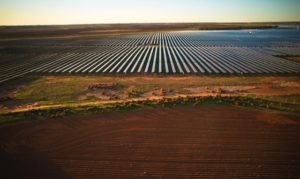Perth-based Carnegie Wave Energy has trebled its bet on what it sees as a booming micro-grid market in Australia and overseas and decided to take full ownership of the solar and and battery storage and micro-grid business Energy Made Clean.
Carnegie, which is one of the world leaders in wave energy systems and is also preparing to build the world’s first micro-grid including wave energy, will pay a total of $13 million in shares and cash to lift its stake in EMC from 35 per cent to 100 per cent.

CEO Michael Ottaviano says the global micro-grid market is expected to quadruple to around $40 billion in the next few years, driven by plunging costs of solar and storage, and the growing push for more resilient electricity supplies.
Ottaviano points to the recent blackout in South Australia, saying that rather than focus on new big interconnections, as many have suggested, the government and the industry should be focusing in micro-grid alternatives.
This reflects the response of New York to the impact of Hurricane Sandy. Even AGL Energy recognises that the way to achieve the best security is to invest in more renewables, and to create local micro-grids. Western Power is also looking down a similar path to re-organsie its centralised grid structure.
“One natural response out of South Australia is you will see those entities that have large critical loads will look to self-generate and have micro grids, and not rely entirely on long transmission lines,” Ottaviano told RenewEconomy.
“We are seeing the same pattern across the world,” he added, although apart from Western Australia, there had been few examples in Australia.
“Right now, there are already signifiant parts of market where people are using cheaper, cleaner more secure solutions through the deployment of micrgrids.
“If you look at the likes of (retailer) Synergy, (network operator) Western Power, and the Department of Defence, they are not basing decisions because it feels right or is based on ideology. They’re driven by fundamentals such as cost and security.”
Ottaviano says the purchase of EMC will make Carnegie the only ASX-listed company with the ability to deliver a dedicated renewable energy microgrid, and he sees the potential of this technology replacing more than half of the 400GW of thermal capacity currently in place in islands across the world.
“Carnegie is now at the forefront of designing, developing, financing, constructing, operating and maintaining microgrids, utilising a world-first combination of wave, solar, wind, energy storage, desalination and diesel in both on and off-grid applications in Australia and internationally,” he said in an earlier statement.
“Microgrids are increasingly a major part of the renewable energy market as they can deliver cost competitive, clean power and energy security. It is the right time to seize this opportunity.”
The purchase price will include cash of $2.6 million and $10.4 million in shares, leaving EMC founder and principal John Davidson with a 13 per cent stake in Carnegie, making him the largest shareholder in the combined company. EMC had revenues of $16 million in its last financial year.
“Over the past few years, EMC has grown from an innovative start up to delivering major contracts to local utilities, developing a unique capability that can be applied across Australia and globally,” Davidson said. “With Carnegie we will be able to grow larger, more quickly and capture this enormous market opportunity.”
Among its projects are the solar and storage microgrid on Mackerel Island off the coast of Onslow in Western Australi, a 1.64MW solar (pictured above) and battery storage array for the CSIRO-led Australian Square Kilometre Array Pathfinder and a 600kW solar farm on Rottnest Island.
Ottaviano said the partnership would allow EMC to grow quicker and provide a solid platform for Carnegie, which is only now rolling out its technology on a commercial scale. “This is a massive market,” he said.










